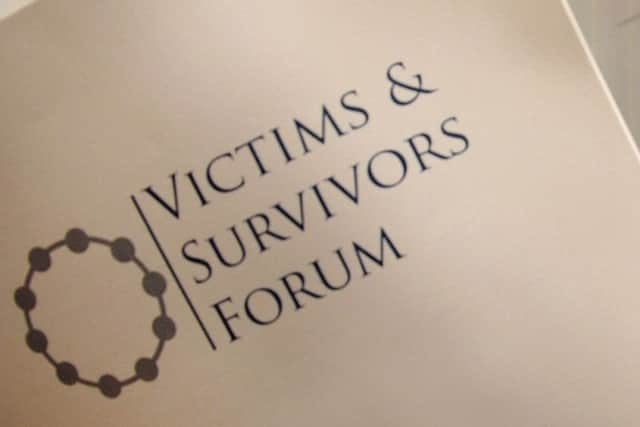Alex Kane: Legacy cannot be solved while the past is still before us


Responding to the announcement, Jeffrey Donaldson said: “Funding for victims’ groups has paled in comparison to that received by prisoners’ groups. The treatment of innocent victims as second-class citizens must end immediately. We will also be making it clear to government that it must not equate innocent victims with the perpetrators of violence and that any definition of victim must exclude those engaged in any acts of terrorism.”
Thirteen years later and the debate is ongoing. I wrote at the time – and I’ve repeated it many times since then in this column – that I didn’t ever expect a resolution: ‘For so long as we have conflict stalemate rather than conflict resolution; and for so long as the constitutional question remains front and centre of politics here, then I don’t see how we move past competing narratives. I don’t see how something along the lines of a truth and reconciliation commission could ever work. Since the ‘past’ is always in front of us in Northern Ireland I don’t see how we ever manage to come to grips with the present, let alone the future.”
Advertisement
Hide AdAdvertisement
Hide AdDealing with the legacy of a conflict is only possible when all sides have agreed that the past is behind them and that they want to build a joint future together.


Yet, almost a quarter-of-a-century since the 1994 ceasefires which paved the way to a talks process and – albeit not without massive hiccups along the way – the Good Friday Agreement, we are more polarised than ever; and all political debate is down to nothing more sophisticated than a constitutional question numbers game. (By the way, this impasse has nothing to do with Brexit. We had reached this point years before the referendum.)
Anyway, it is not possible to resolve legacy against this sort of background. Resolution requires joint narrative and a sense of collective community justice. Stalemate requires your own narrative and propaganda – pitched solely at your own side. I’m sorry that none of this brings any comfort to those of you who lost loved ones; particularly those of you, on both sides and none, who were the victims of paramilitary violence.
Any deal based on the ‘protection from prosecution or investigation’ of individuals or groups is not going to be a runner. Any deal based on ‘moral equivalence’ is not going to be a runner. Any deal based on a general amnesty is not going to be a runner. Any deal based on drawing a line in the sand – a sort of ‘let’s-begin-again-from-here’ approach – is not going to be a runner.
Advertisement
Hide AdAdvertisement
Hide AdAt the heart of the problem is the fact that the vast majority of people – even those who wouldn’t describe themselves as victims – don’t believe that things have moved on very much since April 1998. Fair enough, they would probably accept that Belfast is a better, safer place; that Northern Ireland is certainly more peaceful; and that it’s good not to have to duck every time a car backfires. But in terms of politics and community relations – and it’s reflected in the electoral fact that two-thirds of voters have gravitated to DUP/SF and the stagnation of the so-called middle-ground – we’ve barely moved on at all. In other words, the conflict is continuing by other means and in slightly different guises.
The wreckage of the Troubles’ legacy is all around us. The political language of the Troubles remains in everyday use. Almost every political discussion begins and ends with the past.
People who feel the pain of loss every single day have very little expectation of that pain ever being alleviated. Psychiatrists are aware that evidence of a loved one ‘not having died in vain’ (in other words, there is demonstrable proof that the roots of a problem have been addressed and resolved and that there is very little likelihood of a return to the ‘bad old days) can be of huge benefit to a society emerging from conflict. But, as I’ve said, there isn’t much evidence pointing to that conclusion.
In the series of legacy essays written for the News Letter over the past couple of months a number of contributors have suggested that it would be useful to have professional historians sifting through the evidence to try and establish an accurate, genuinely impartial narrative.
Advertisement
Hide AdAdvertisement
Hide AdTo be honest, I’m not sure that is possible. Even historians bring their own bias; often focusing on areas of particular interest to them. And even if they did produce a report – and I wouldn’t even hazard a guess at how long it would take to write and deliver such a necessarily massive tome – I’m pretty sure it would be shredded when it had first contact with the political parties and various victims’ groups.
Is there another way of approaching the legacy issue? Actually, I think there is: but, having said that, it could be fraught with all of the same problems that have bedevilled every other attempt to tackle legacy over the last 20 years or so. In my next two columns for the News Letter I’ll outline an approach that will, I hope, at the very least, push the debate in a slightly different direction.